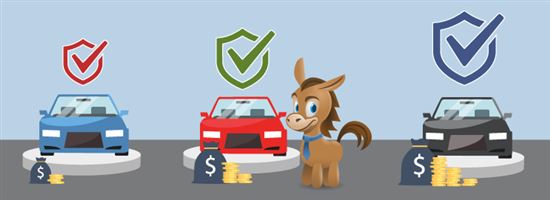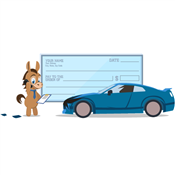What Should I Be Paying for Car Insurance?
Auto insurance might be one of the most expensive bills you have. Are you paying too much? Read on to learn the reasons your premiums are so high.
 |
| © CreditDonkey |
The average car insurance policy in the U.S. is $1,300 a year. But prices can range from $900 to $2,500.
Why the big difference?
A variety of factors determine how much you pay for auto insurance. In general, insurance companies look at averages and trends to determine rates.
Keep reading to learn more.
What Determines My Car Insurance Rates?
 |
| © CreditDonkey |
Here are some of the factors that determine your car insurance premiums.
Location
Auto insurance costs less in rural areas because there are more claims in larger cities. Even within cities, some places experience more accidents than others. Companies will charge higher premiums to pay for expected claims in your areas.
That means even if you have a clean driving record, you may pay more depending on where you live. Companies will charge higher premiums to pay for expected claims in your areas.
Age and Gender
Statistically, male drivers under age 26 get into the most accidents. This means they are the riskiest people for insurance companies to insure. (Young female drivers with clean driving records will also pay higher premiums before they turn 26.)
Many young drivers stay on their parents' policy for as long as they can and just pay their portion of the bill. This tactic can save them hundreds of dollars a year. Of course, any claims will still fall under the parents' policy.
And keep in mind: the national average of adding a teenager driver to your auto insurance policy is an increase of about 80%.
Any at-fault claims that fall under your policy will only pay up to the policy limits. Serious accidents can result in hundreds of thousands of dollars in damages and medical expenses. If these costs exceed your policy limits, you will be responsible for all other expenses completely out-of-pocket.
Driving & Claims History
If you've had accidents, speeding tickets, and other traffic violations in the last 3-5 years, expect to pay higher premiums than those with clean driving records. Even one at-fault accident can raise the cost of auto insurance to a higher rate.
Accidents can happen to anyone, but statistics show that people with claims on their record are more likely to be in additional accidents.
If you go 3-5 years with a clean driving record, your auto rates will drop as the accidents and violations fall off your insurance history.
Vehicle Type
Today's vehicles have advanced technology, which makes them more expensive to repair or replace. Even minor fender benders can cost upwards of $1,000 to fix if there are sensors and cameras on the car.
Some vehicles also experience a higher number of claims due to accidents. Even if the vehicle type had nothing to do with an accident, it may still affect the company's rates for that vehicle.
This is also true with thefts—some car models are stolen more than others.
Vehicle Coverages
Carrying low deductibles on your car's physical damage coverage will result in higher premiums. You may want to raise your deductibles to $500 or $1,000 for both Comprehensive and Collision coverages.
If you have a vehicle 15 years or older, consider dropping full coverage in favor of liability only. The extra premium for full coverage on a vehicle worth $4,000 might not be worth it.
Adding collision coverage on newer vehicles can cost between a few hundred dollars to $1,000 (or more). The cost of carrying physical damage coverage to your vehicle determines whether insurance companies consider you a lower-risk driver or a higher-risk driver.
Liability coverage pays out damages and medical bills to other people that you are held responsible for. Any damages that exceed the limits of your policy will come directly out of your pocket.
Credit Score
Insurance companies look at your credit score to help determine rates. Statistically, people with low or bad credit get involved in more accidents. Companies set higher rates to help cover these claims.
People with good credit can expect to pay up to a few hundred dollars less in premium each year than people with average or bad credit.
Most insurance companies call your credit score by another name, like insurance score. Some states' legislatures have passed laws to limit running someone's insurance score for new policies OR whenever the insured requests it.
In the past, companies ran insurance scores at each renewal, often raising people's rates despite no other activity on their account.
Your Company
Some companies have higher rates than others. For example, some offer higher rates for young drivers or penalize heavily for those with a history of claims.
Even if you're happy with your current insurer, see how they stack up by getting quotes from multiple companies. If the quotes stay within the same premium range, you'll know you are currently paying the right amount.
Many people have saved hundreds of dollars each year simply by switching to a different company.
Otherwise, your initial quote won't be accurate. If you decide to purchase that policy, the company will run your MVR report and your premium will go up.
These factors may cause your rates to rise. Keep reading for ways to pay less.
Car Insurance Discounts
 |
| © CreditDonkey |
Many companies offer ways to lower your car insurance premiums. Be sure to ask about these discounts before buying.
Multi-Policy
Most companies offer a 15% discount if you also maintain, too. Usually this discount applies to both premiums, though sometimes it affects only the auto insurance.
Other policies that can qualify for this discount include:
- Dwelling fire policies (owning a home that someone rents from you)
- Recreational vehicle policies
- Motorcycle policies
- Some commercial policies
- Personal umbrella policies
It's a great and inexpensive way to protect your assets if you are responsible for someone else's damages and medical expenses.
$1 million umbrella policies usually start at $150/year. The $1 million of liability coverage is in addition to your home and auto liability limits.
Multi-Vehicle
Insurance companies give discounts for having more than one vehicle on your policy. Your overall premium may increase, but you'll be paying less per vehicle.
Low Mileage
Many companies offer a lower rate for vehicles you rarely drive. This discount typically starts at around 8,000 miles a year. Some companies offer an even bigger discount for vehicles driven well below that.
Driving above 8,000 miles/year won't hurt your rates. But you can lower your auto premiums by driving less, especially if you sign up for a usage-based insurer like Metromile Insurance. Find out if the company and the model are right for you in our review of Metromile.
Profession & Education
Some insurance companies offer discounts to people with at least a bachelor's degree. Those working in fields with a statistically low number of claims may also pay less in premiums.
These include:
- Teachers
- Lawyers
- Accountants
- Managers
- Some types of office jobs
Why do these professions catch a break? Historical data shows that people with higher education and better-paying jobs tend to experience fewer accidents.
Payment Discounts
Some companies offer a discount based on the way you pay your insurance bill.
- Pay-in-Full: You may earn up to 20% off the total premium by paying for the entire policy at once.
- EFT: This discount applies to monthly payments that are automatically taken out of your checking account each month. Check with your insurance company to see if they offer it.
Telematics
More and more insurance companies are offering their customers a discount for using a telematics device. These are small, easily installed devices that track:
- How fast you accelerate and brake
- The number of miles you drive
- Time of day that you drive
Telematic devices do not track speed, and drivers cannot be penalized for scoring low.
Bottom Line
Many factors go into determining your premiums. But that doesn't mean you can't compare rates. Get quotes from several companies to find the best rates.
And remember, as your life changes, the company that suits your needs and budget may change as well. Make sure you're not paying more than you should be for auto insurance.
Write to Andrew Flueckiger at feedback@creditdonkey.com. Follow us on Twitter and Facebook for our latest posts.
Note: This website is made possible through financial relationships with some of the products and services mentioned on this site. We may receive compensation if you shop through links in our content. You do not have to use our links, but you help support CreditDonkey if you do.
|
|
|










